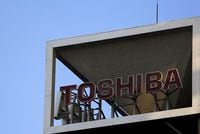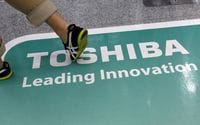TOKYO (Reuters) - Investors dumped shares in Japan's Toshiba on Friday, as closure on the company's $1.3 billion accounting scandal appeared further out of reach after new revelations of losses at its U.S. nuclear unit Westinghouse.
The laptops-to-nuclear conglomerate confirmed an earlier media report saying the Westinghouse nuclear business had booked losses in fiscal years 2012 and 2013.
The company defended its disclosure practices, saying it did not need to write down such losses because the Westinghouse operation was profitable overall.
But the shares, which had already fallen around 39% after the company revealed past accounting problems in April, plunged as much as 9.2% to a near three-year low as investors doubted whether Toshiba would regain credibility any time soon. The shares later erased some of the losses to be down 5.4%.
Nicholas Smith, a strategist at brokerage CLSA, said the latest news came just as some investors were considering betting on a recovery in Toshiba shares.
"I think some of the braver hedge funds were mulling it, and are now feeling really lucky that they hadn't pulled the trigger," he said.
Toshiba has said it inflated its profits by about 155 billion yen ($1.26 billion) over roughly seven years. An independent accounting probe said in July that the company suffered from dysfunctions in governance and a culture of discouraging employees from questioning their superiors.
Analysts have long speculated that the value of assets and goodwill related to Westinghouse, in which Toshiba has an 87 percent stake, has been overstated, especially as the Fukushima disaster and the U.S. shale boom have reduced the appeal of nuclear power.
The company said in July that it was considering lowering its stake in Westinghouse.
Martin King, co-managing director at Tyton Capital Advisors, said some investors may find Toshiba's bad-to-worse moment to be a good buying opportunity.
"In terms of corporate governance and company politics it's farcical, but the company does have profitable businesses. I'd say now is a better time than most to consider allocating," he said.
(Writing by Ritsuko Ando; Editing by Muralikumar Anantharaman)



